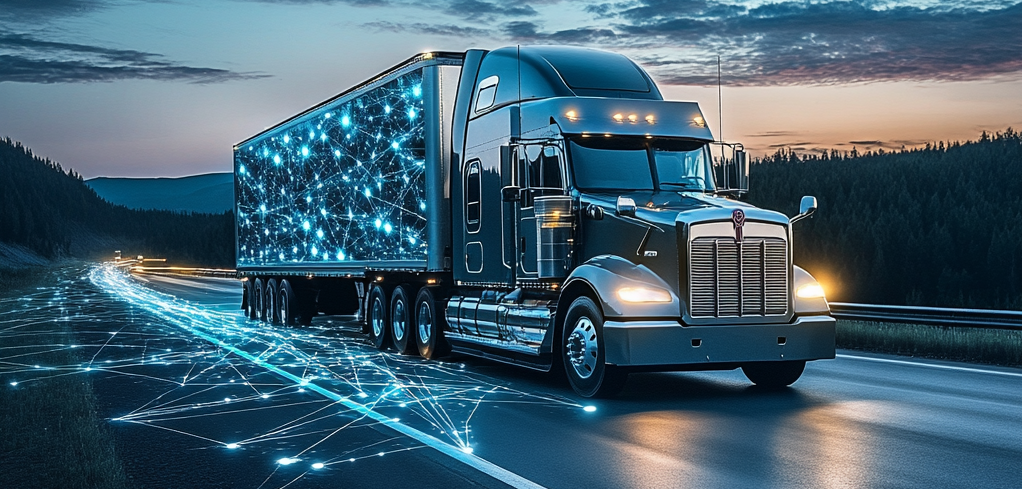Get Ready for Big Changes to LTL Freight Classification
Updated LTL Freight Classification System Launching July 2025

BACK TO BLOG
Artificial intelligence (AI) has been shaping industries, and trucking is no exception. To understand how AI is revolutionizing the logistics and trucking sector today, it’s helpful to take a step back and explore its origins.
The concept of artificial intelligence took root in the 1950s when Dartmouth computer science professor John McCarthy coined the term, defining it as “the science and engineering to make intelligent machines.” During this period, researchers began exploring neural networks and the foundational ideas behind machine learning.
Fast forward to the 1990s and 2000s, where advancements in computing power and access to vast data sets propelled AI research forward at a rapid pace. These breakthroughs laid the groundwork for the AI technologies gaining popularity today in trucking and logistics.
The COVID-19 pandemic accelerated the adoption of AI across industries, including trucking. Economic challenges and operational disruptions led businesses to embrace new technologies for efficiency and resilience.
The supply chain and logistics industries faced heightened demand for goods and services for people stuck at home, all while grappling with labor shortages, safety concerns, and wildly fluctuating costs. AI-powered tools offered help for many of these challenges, driving innovation in fleet management, route optimization, and safety monitoring.
AI is rapidly transforming how trucking companies operate. According to a report from fleet management software company Samsara, 94% of leaders in the trucking and logistics industry believe investing in AI is essential to stay competitive, and over half (51%) have already integrated AI into their operations. An astonishing 87% plan to increase their AI investments in the next year.
Here’s how AI is having an impact today:
Data-Driven Insights
: Trucks generate massive amounts of data daily—far more than a human can process. AI models analyze this data to detect patterns, predict risks, and optimize operations. For example, AI can identify potential crashes, risky driving behaviors, and vehicle maintenance needs before they become costly problems.
Dynamic Route Optimization
: AI uses real-time data, such as traffic conditions, weather updates, and demand fluctuations, to adjust delivery routes. This not only ensures timely deliveries but also improves fuel efficiency and maximizes fleet utilization.
AI-Assisted Communication
: Generative AI automates responses to routine inquiries from drivers, brokers, and customers. This capability speeds up processes like quoting shipment costs, resolving minor issues, and providing route updates—saving valuable time for human experts to focus on more complex challenges.
Operational Efficiency
: AI helps streamline decision-making. Tasks traditionally handled by dispatchers, such as scheduling and route planning, are now supported by intelligent software systems operating around the clock. This ensures better customer service, reduced costs, and fewer service failures.
AI's role in trucking is only growing. Industry experts predict increased use of AI in freight management, with tools to enhance performance and optimize supply chains. Generative AI will continue to revolutionize administrative tasks, enabling faster, smarter communication between carriers, brokers, and drivers.
As AI technologies mature, trucking companies will increasingly leverage predictive analytics, machine learning, and automation to drive efficiency and safety.
Recognizing the importance of AI, the U.S. Department of Transportation has taken steps to integrate it into regulatory practices. In 2024, Vinn White, an expert in AI and emerging technologies, was appointed Deputy Administrator of the Federal Motor Carrier Safety Administration (FMCSA). As Deputy Administrator, Mr. White will also serve as the agency’s Acting Administrator. White also serves as the U.S. Department of Transportation’s (USDOT) Acting Chief Artificial Intelligence (AI) Officer.
This move underscores AI's critical role in shaping the future of transportation safety and regulation.
AI is no longer a futuristic concept; it’s here and transforming the trucking industry. From optimizing operations to enhancing safety and communication, AI is helping trucking companies navigate the complexities of modern logistics.
For truck drivers and industry professionals, understanding and embracing AI isn’t just about keeping up—it’s about thriving in an increasingly tech-driven world. As the road ahead unfolds, AI will continue to drive innovation and efficiency in trucking, making the industry safer, smarter, and more resilient.